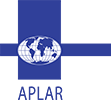
APLAR Gout Registry
Gout in populations across Asia-Pacific countries are highly diverse and variable in terms of genetic makeup, socioeconomic status, lifestyle and healthcare systems. A comprehensive portrayal of people with gout in the Asia-Pacific region is therefore needed. With the support from the APLAR, the crystal-induced arthritis special interest group is creating a gout registry which aims to describe the clinical characteristics of gout patients under rheumatologist care in Asia-Pacific region.
Participating rheumatologists from different APLAR Member Nation Organizations will prospectively collect data of gout patients during their routine clinical care. Variables collected included demographics, comorbidities, current medications, clinical manifestations of gout at diagnosis and at recruitment, gout treatment, serum urate levels, presence of gout flare and gout clinical scenarios. Gout clinical scenarios consists of nine fundamental clinical scenarios for gout created by the ACR core expert panel during the development of the 2012 ACR guidelines for the management of gout. The scenarios included gout patients without tophi categorized by frequency of gout flare (scenario 1–3), patients with at least one tophus and intermittent gout flare (scenario 4–6) and patients with chronic joint symptoms due to synovitis attributable to gout or articular tophus or tophi (scenario 7–9). Characteristics and attributable risk factors of gout patients according to clinical scenarios will be analyzed.
The development of APLAR gout registry may help practicing rheumatologists in the Asia-Pacific region to better understand how their gout patients are faring and may lead to better diagnostic and treatment outcomes.
For further inquiries about participating in the Gout registry, please contact the APLAR secretariat secretariat@aplar.org.
If you are registered user, please login below:
